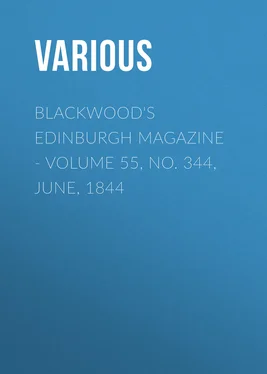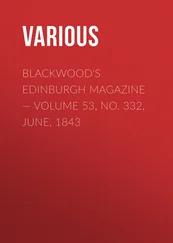Various - Blackwood's Edinburgh Magazine. Volume 55, No. 344, June, 1844
Здесь есть возможность читать онлайн «Various - Blackwood's Edinburgh Magazine. Volume 55, No. 344, June, 1844» — ознакомительный отрывок электронной книги совершенно бесплатно, а после прочтения отрывка купить полную версию. В некоторых случаях можно слушать аудио, скачать через торрент в формате fb2 и присутствует краткое содержание. Издательство: Иностранный паблик, Жанр: foreign_antique, periodic, foreign_edu, на английском языке. Описание произведения, (предисловие) а так же отзывы посетителей доступны на портале библиотеки ЛибКат.
- Название:Blackwood's Edinburgh Magazine. Volume 55, No. 344, June, 1844
- Автор:
- Издательство:Иностранный паблик
- Жанр:
- Год:неизвестен
- ISBN:нет данных
- Рейтинг книги:4 / 5. Голосов: 1
-
Избранное:Добавить в избранное
- Отзывы:
-
Ваша оценка:
- 80
- 1
- 2
- 3
- 4
- 5
Blackwood's Edinburgh Magazine. Volume 55, No. 344, June, 1844: краткое содержание, описание и аннотация
Предлагаем к чтению аннотацию, описание, краткое содержание или предисловие (зависит от того, что написал сам автор книги «Blackwood's Edinburgh Magazine. Volume 55, No. 344, June, 1844»). Если вы не нашли необходимую информацию о книге — напишите в комментариях, мы постараемся отыскать её.
Blackwood's Edinburgh Magazine. Volume 55, No. 344, June, 1844 — читать онлайн ознакомительный отрывок
Ниже представлен текст книги, разбитый по страницам. Система сохранения места последней прочитанной страницы, позволяет с удобством читать онлайн бесплатно книгу «Blackwood's Edinburgh Magazine. Volume 55, No. 344, June, 1844», без необходимости каждый раз заново искать на чём Вы остановились. Поставьте закладку, и сможете в любой момент перейти на страницу, на которой закончили чтение.
Интервал:
Закладка:
“‘Silly prattle!’ interrupted the little one. ‘Thy old father lies under the rock side, and snores till the fern leaves waggle over him. The good man’s dinner will not take much harm. However, that thou mayest see how good and honourable my intentions are, take thou my little cap. Be it the pledge which I shall redeem from thee with a compensation. Only resolve quickly now whether thou wilt trust me. My time is short.’
“Maud hesitated still. She held the miraculous cap with its silver bell in her hand. The desire to get rid of the uncanny creature the sooner the better, and also, perhaps, a particle of female curiosity wrung from her her consent.
“‘Good!’ said the little one in great glee. ‘Now, hear me! This day week, upon Whitsun-eve, as ye call it, do thou come here in the evening, as soon as the moon has mounted this green hill. Be not afraid; for only good will befall thee. As soon as thou hast reached this spot, ring with the little bell which I have given thee; and thou wilt not repent having been serviceable to the good people.’
“Scarcely had the little man given Maud her direction, when the astonished maiden remarked that the ground before her feet flashed like molten gold, sunk deeper and deeper, and in this glowing gulf the extraordinary being vanished, like a silver star. The whole phenomenon lasted only a few seconds, then every thing was again at rest as before. The little bell-flower only assured Matilda that she did not dream, and that something unusual had really taken place.
“Possessed with her feelings, she took her father his meal; and found him, in sooth, fast asleep under the wall of rock. Of her adventure she said nothing, but carried the pledge of the little man well secured in her bosom. And yet how was it possible for her to persevere in her silence? It is true, Maud knew not if the communication of the incident was permitted her. She put her trust, however, in the pledge; and, since she had not been commanded to silence, she hoped to be justified in making Albert acquainted with what had happened.
“She did it with fear and trembling, and produced to her astonished lover, as witness, the flower which had withered in the warmth of her bosom. Singularly enough, let her shake it as often as she would, the little bell could not be made to ring.
“‘And you really mean to go?’ asked Albert, when he had a little recovered from his surprise. ‘I should like to see you! To get flirting with ghosts and hobgoblins, or whatever else the devils may be. No! go you don’t. You will throw that stupid thing into the running stream. There it won’t hurt you; and upon that confounded Sun’s hill you will please never to set foot more.’
“‘I have given my word, Albert; and I must keep my word let what will happen.’
“‘Very well,’ said the youngster, ‘that’s enough! Then every thing’s at an end between us—clean at an end!’
“‘How you take on now! For whom else, but for you, have I accepted this pledge? For whom else have I so long endured—so long borne my father’s upbraidings? Dost thou think that, had I wished it, I could not long since have wedded? And is it my fault that I am a Sunday’s child? Is it not said that all Sunday’s children are born to good-luck? If you hinder me from keeping my word with this miraculous being—and the luck that is decreed me is meanwhile scattered to all the four winds—you may settle it with the spirit and face his anger; for I wash my hands in innocency.’
“Maud began to cry, kissed the shrunken leaf, and hid it again in her bosom. Albert was not at ease. He was annoyed at the untoward encounter, a touch of jealousy disquieted and distressed his soul, and yet he could not say that the girl was in the wrong. At length he said, dispiritedly—
“‘Go through with your folly then. I will, however, be near you, and if the moon-spun rascal takes improper liberties, I will snap his neck, though mine too should crack for it.’
“For the first time in his life, Albert parted with Maud in an ill-humour, and the poor girl herself passed a bad and restless night.
“‘Mother,’ said Maud a few days afterwards, whilst she was getting the father’s dinner ready for her, ‘did you ever see a fairy?’
“‘God forbid, girl!’ cried the worthy and somewhat timid woman, crossing herself. ‘How came that into thy head? What hast thou to do with fairies and elves, dwarfs and wights? A good Christian has no business with such things of nothing, or worse.’
“‘Why, aunt Nelly was telling the other day such surprising stories of the people!’ Matilda replied; ‘but she did not drop a hint of our having reason to fear any harm from them. She even called them the good people.’
“‘Daughter!’ the mother seriously rejoined, ‘we call them so that they may do us no mischief. It is safer for us to leave them quite alone.’
“‘Can it be true, mother, that they have buried themselves under the Sun’s hill, and keep house and home there? Aunt Nelly would have it that in the still of the night, by bright moonlight, you may hear them singing wonderful tunes.’
“The mother fixed her eyes upon Maud, set the old man’s morsel of food upon the hearth stone, and, taking her daughter by the hand, led her to the stove, and seated her upon the family bench.
“‘Listen!’ she said, ‘and take thou heed to my words. The good people, or the fairies, which is their proper name, although they do not like to be called so, do indeed live, though few have the gift of beholding them, in all the mountains and valleys round about. Very, very seldom, and only upon the most extraordinary occasions, do they ever show themselves. When they do, it betokens luck to him that sees them, and brings it, if he quietly fulfill their wishes. These are certainly often out of the way, just like the people, who are strange and incomprehensible enough. Thank Goodness, they never crossed my path! but your godmother Helen, she had many, many years ago, a curious adventure with the fairies.’
“‘Really, mother! Aunt Nelly spoken to the fairies! O pray, dear mother, tell me quickly and fully the whole story!’
“‘First run to the quarry, and take your father his dinner,’ said the mother. ‘I will try in the meanwhile to remember all about it; and if you will promise me to say not a word to any one—not even to your godmother, you shall hear what your aunt told me at that time.’
“Maud very naturally promised every thing, took herself off, and was back again as quickly as possible. She did not loiter for a moment upon the road, did not even notice the signals which her Albert made as he came towards her from the distance. She could think only of her mother’s story.
“‘Here I am again, mother!’ she said breathless. ‘I call that running! I should say that the king’s trained runners could do no better. But now begin, dear mother. I will listen to you as if you were saying mass.’
“‘As well as I can remember,’ proceeded the mother, ‘the case of the fairies is a very singular one. Your godmother Helen disclosed to me, it is true, just the chief particulars only; but they were quite enough to let you understand something of the good people. They told her that, once in every fifty or a hundred years, they have a kind of church meeting, which from old time they call a Sabbath. For you must know, child, that the fairies are properly Jews, 15 15 The fairies themselves hardly can have imparted to godmother Helen the two irreconcilable derivations of their order: that they were Jews, and that they were fallen angels. But the poet dramatically joins, upon the mother’s lip, the two current traditions. With her, fallen angel and Jew are synonymous, as being both opposed to the faith of the cross.
right down old chaffering Jews, from Olim’s time.’ 16 16 Who is this unknown Olim? Our old friend perchance, the Latin adverb, “ Olim ,” of yore —gradually slipped from the mouths of scholars into the people’s, and risen in dignity as it descended.
Интервал:
Закладка:
Похожие книги на «Blackwood's Edinburgh Magazine. Volume 55, No. 344, June, 1844»
Представляем Вашему вниманию похожие книги на «Blackwood's Edinburgh Magazine. Volume 55, No. 344, June, 1844» списком для выбора. Мы отобрали схожую по названию и смыслу литературу в надежде предоставить читателям больше вариантов отыскать новые, интересные, ещё непрочитанные произведения.
Обсуждение, отзывы о книге «Blackwood's Edinburgh Magazine. Volume 55, No. 344, June, 1844» и просто собственные мнения читателей. Оставьте ваши комментарии, напишите, что Вы думаете о произведении, его смысле или главных героях. Укажите что конкретно понравилось, а что нет, и почему Вы так считаете.












